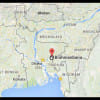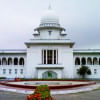Extrajudicial Killing: Sordid admission, cryptic apology

"There were quite a few cadres (armed goons) and hoodlums in Savar. Now the situation is still as water. No one dares to utter a word. I have put five persons to cross fire and have prepared the list of another 14. It's all very quiet. After the list was prepared one or two (individuals) grabbed my feet and appealed to me to spare their life and promised 'we will be behaving from now on'". This is how a serving Member of Bangladesh Parliament, a medical doctor by vocation, explained the situation of his constituency (Dhaka 19)to a Bangla tabloid on July 19.
Within days the MP "withdrew" his own "uncalled for, indecent and condemnable" utterances. He felt "ashamed" and "sorry" and apologised to the nation. He went on clarify that the he bore "full responsibility" for his act and there was no involvement of the government or his party, Bangladesh Awami League. The Bangla daily in its original report noted that it had records of the conversation with the MP.
On October 1, 2016 Shah Alam alias Nayan, the organising secretary of Savar unit of Jubo Dal, the BNP youth affiliate, was allegedly killed in "crossfire". He was picked up on September 30 from his Mohammadpur residence by two sub-inspectors of Savar police station. The law enforcement agency churned out the standard narrative--that Nayan was killed in encounter with miscreants when police went to recover arms after his arrest. The region experienced a few more such killings in the preceding and following months.
The MP's statement had a chilling effect on the opposition activists of Savar. Newspaper reports quote them expressing their feeling of insecurity. Many have reportedly fled the area; others have switched off their phones to hide their location. Some are eager to find if their names appear in the MP's list. If crossfire incidents in the recent past haunted them, the MPs admission only reinforced their feeling of existential threat.
The MP's statement elicited some interesting responses. Reacting to it the veteran Presidium member of the ruling party and the minister of health noted, "People's representatives should be cautious before making such assertions. They should think twice about the reaction of the people such statements may elicit". Both RAB and police distanced themselves from the MP's statement. The spokesperson of RAB advised journalists to ask the MP about whom he put to crossfire and where. It appears that the forces did not feel the urge to secure any explanation from the MP on his confessions; nor those at the helm to ensure enforcement if the law appear to be disposed to launch any inquiry.
Over the years the leadership of law enforcement agencies as well as their political masters assiduously denied the claims of extrajudicial killing. In February this year, the Home Minister informed the Parliament that no extrajudicial killing is taking place in the country and the government is determined to establish the rule of law. He went to claim that the government shows "zero tolerance" of the practice. The MP's admission has rendered such a contention untenable. This is not the first incident that a ruling party MP made references to crossfire. In mid-August 2016 another influential MP of Dhaka expressed his outrage at such killings by the RAB of a Jubo League activist.
Jurists have noted that the Enamur Revelation is the "manifestation of lawlessness" and "abuse of power by the politicians". The National Human Rights Commission has demanded investigation. If proved, such an offence can be charged as a conspiracy to commit crime (Sec 34), abetment of crime (Sec109), and committing of murder (Sec 302 of the Penal Code, 1860.)
The candid admission and the subsequent apology validate what the rights activists and a tiny segment of Bangladesh's intelligentsia have long been hammering on about. It unwittingly exposed the brute reality of the existence of extrajudicial killings and the alleged use of law enforcement agencies to quell political opposition. The episode also brought into the open the reality of criminalisation of politics in Bangladesh—how a person sworn to the Hyppocratic Oath, who earned the respect of the nation during the Rana Plaza tragedy, within years get frenzied by power and has little qualm in physically liquidating political opposition.
It is disheartening to note that MP Enamur's revelation has created little ripple among the political circles as well as in the mainstream civil society. It did not merit being a subject for op-eds in the national dailies or worthy of discussion in the umpteen numbers of talk shows that scramble for topics of interest for the viewers. One is also perplexed why even such horrendous disclosure does not ruffle the conscience of those who so eloquently champion the "Spirit of Liberation" of Bangladesh. After all, for lesser mortals that Spirit does encompass freedom from fear, and the right to live and die with dignity.
C R Abrar teaches International Relations at Dhaka University. He writes on migration and rights issues.










Comments